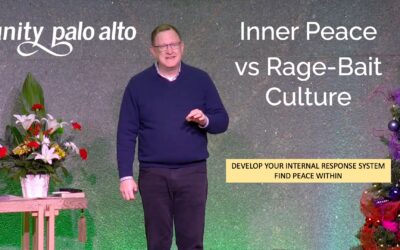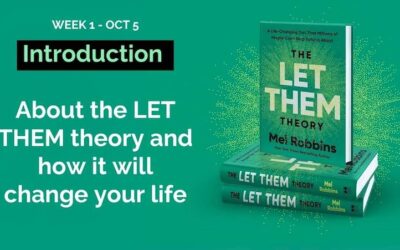Subscribe to Unity Palo Alto's Youtube channel!
Join Reverend John Riley as he discussed what perfection is, and whether it’s attainable.
Watch the full Sunday Service here.
Transcript of What is Perfection? Is It Attainable?
Good morning. Well, here we are smack-dab in the middle of spring. Did you know that? Well, it’s not quite. There’s a couple more days. Maybe I’m a day off. I looked it up because I didn’t want to be wrong. Smack-dab means “exactly”. Did you know that? Almost in the middle of spring. How about that? We’re like, right there.
And I’m pretty excited because my garden is starting to bloom and blossom and that’s my sanctuary in the backyard. I just wanted to point out the flowers that are on the screen here. I’ll put them online for the live stream viewers. Isn’t that beautiful, a beautiful expression of the divine. Those are, that’s an anemone bush. I forgot the Latin name already. Something californica, Carpenteria californica. I studied for like five minutes. But look at how beautiful that top one is. It looks perfect, doesn’t it? Then the one on the bottom, well, it’s seen its better days. It might be a little faded but that’s what flowers do, right? They come and they go. They’re beautiful and then they’re gone. Then the rest of the year you’ve got this bush and the bush in and of itself is beautiful.
We don’t pay much attention to it because it’s not blooming at that time, but it fills out the backyard. As my landscape architect, my neighbor across the street says, it’s the bones in the backyard. You have to have the structure and so even without the flowers the bush is incredibly beautiful. What a beautiful expression of this thing called God or isness, or divine mind. I don’t want to put anyone out. The sum and source of all that is. The allness of life, love and wisdom just blooming. Perfect, in this very moment. Perfect, in this very moment. Even the one that was wilting because it’s doing exactly what it’s meant to do — to bloom, to wilt, to do its thing, to attract the bees, to attract the hummingbirds, to create life.
Perfection
It’s just a beautiful expression of this thing we talk about in Unity. Sometimes we talk about it as this divine impulse. There is this divine impulse that’s in everything, that’s in all creation, that’s calling us to be that essence of who we are, that truer self, that truer self, that flower.
The challenge is in the word perfection because that word perfection is not real. Perfection doesn’t exist except within our own judgment of something. I’m sure if you looked at that top flower long enough you’d find some imperfections in its beauty. If you are a horticulturist, I’m sure right off the bat you would tell me what’s wrong with my plant, why there are only two flowers. Those were the only two flowers on my plant by the way. The wonder of the telephoto lens on my camera. Life is amazing. And yet, even in that imperfection there is beauty. And so often, we are judging ourselves, especially against this scale that we call perfection.
Now certainly in the Bible there’s many sections where it’s kind of hounding, pushing that in. You’ve got to be perfect. You’ve got to follow the teachings attributed to Jesus exactly this way in order to … whatever. The reality is we are never going to be that perfect expression within us because that’s, we’re here as a human being. Now Jesus, the man of Nazareth, was our way-shower. And what he taught was practices in which we can live more fully from that consciousness but he never talked about perfection. He just talked about, keep practicing, keep moving, keep moving into your center, meditating like this, praying like this, being somebody who can express and teach and help other people raise up in consciousness.
So, that idea has been beaten into us in our society and, of course, in the media. You see the perfect body, the perfect streamlined car, the perfect whatever you want to call it. That’s what we strive for, that perfection. And yet none of us will reach that perfection because it’s all based on someone’s judgment. And it’s that judgment that starts building in that sense of blame, shame and guilt within us, that judgment.
Gifts of Imperfection
So, I love what Brené Brown said in her book, Gifts of Imperfection. She said, “Perfectionism is a self-destructive and addictive belief system that fuels this primary thought. If I look perfect and do everything perfect, I can avoid or minimize the painful feelings of shame, judgment or blame.”
So, it’s like that idea of perfection and being right is just a layer on top of that blame, shame and guilt that’s already there, that’s been pounded in us throughout the ages, instead of trying to release that blame, shame or guilt and allowing ourselves to just simply be. And when we rise above that blame, shame and guilt, we start to feel naturally a more sense of willingness and lovingness and harmony and inner peace and joy. And that’s when creativity really starts to blossom when we are moving beyond that, those oppressive self-states.
So, this idea of perfection is simply a judgment. She goes on to say, “Healthy striving is self-focused. How can I improve?” And that is good, healthy striving to improve, to move forward, whether it’s your spiritual practice, your health practice, your relationship practice, you’re at work, you’re studying, you’re going to school, whatever it is, you’re striving to learn more, to be more, to do more, to rise up into that higher consciousness, that higher self.
That’s all good, but when it comes to perfectionism, she says, “Perfectionism is other-focused and it’s all about what they will think.” If I’m saying I’ve got to be perfect it’s all because of what I’m afraid of what y’all will think versus “I’m here to grow, I’m here to learn, I’m here to be and to be that flower that blooms and wilts and blooms again and wilts” because every stage in that is perfect, when we look at it from that perspective of God, of sum and source, of the allness of life, love and wisdom.
See, we are all in that divine pattern and we will have our ups and downs and the ups and downs aren’t the problem. It’s our belief system about the ups and the downs. It’s our blame, shaming and guilting ourselves about the ups and downs or other people. If we are constantly arguing about what someone else should be doing, it’s a great mirror for, “Oh well gosh, it’s something in me I know. What should I be doing? How can I look at that internally?”
So, remember that self-striving, that looking for something better, and growing and celebrating when you are going along the path is healthy. But when you’re looking at it from the perspective of perfectionism it can be very damaging to yourself and to others.
The Divine Pattern
This divine pattern is innate within all of us. It’s that seed that was planted within you. It’s what Unity would call the Christ consciousness or, I like the term the I AM consciousness, the I AM-ness of you. This is what was taught in one of the correspondence courses for Unity minister way back when. “The I AM principle is the divine pattern of God which is implanted in every individual and contains all of the elements of God nature.” That I AM principle is that better half of you, that higher consciousness within you and it’s there. And as I say, there is no place where God is not and wherever God is, the allness of God is there, so that allness is within you.
What Really is Perfection?
That leads us to what really is perfection. It’s just simply being as best that we can be in that allness, in the ups and in the downs. It’s minimizing the judgments that we have when we find ourselves at the water cooler, so to speak, and judging other people or judging ourselves. It’s just minimizing it. When we find ourselves upset or hurt or in sorrow or in sadness, just allowing it to be without the judgment. That aligns us with that divine perfection because that’s human consciousness and we are all here to express and experience that human consciousness. We all chose this ride and yet in that human consciousness there’s also the divine consciousness, the I AM consciousness.
It’s a wonderful polarity that you can use. On one hand there’s humble, being just humbled and amazed at the beauty of life expressing, of God expressing, the beauty of the flower, the beauty of the bush in the wintertime that still has leaves, the beauty in the relationships, the beauty in each other, humbled about the magnificence of our universe. At the same time, powerful, powerful spiritual beings because that I AM consciousness, the all of it is within you as well that you can tap into.
So, when you live that polarity, I am both humble and powerful. I am both humble in the sight and in the presence of this divine essence. You might feel it as a loving presence. And I am powerful as a spiritual being to express it, to bring it forth into the world. I am humble at the sight of a flower, at the taste of a really good wine. I’m just saying. And I am powerful in that I can create that wine — well, probably not me but someone can. I am humbled from the standpoint of waking up in the morning and being breathed to life, feeling breath, feeling God move through me as my breath. And I am powerful in that I can get up and take steps forward and speak with that breath.
When we come from that polarity of being humble and powerful, we’re coming from that divine nature. A lot of times we try to just lean on the power, our ego. Our human consciousness is there for power. That’s where struggle and strife comes in when we don’t bring into it the humbleness of being with God, of being that divine spark that Jesus taught we were, and just allowing it to be through our faith.
I love this quote from Lao Tzu who wrote in the Tao Te Ching, “True perfection seems imperfect yet it’s perfectly itself”. What a beautiful definition of perfection. It seems imperfect because we’re all individualized expression of that divine essence. None of us are alike. So, we may seem imperfect and yet we are perfectly ourselves when we live more from that higher consciousness. When we choose to live and ask and when we watch our thoughts, when we watch our words and our interactions, we become the observer of ourself. That’s when we have the opportunity to just pause and go back to that humility, that humbleness, before the allness of life, love and wisdom.
What I have found is that the results are a loving experience, a harmony within me, internally. What I found is inner peace, a time when I can just go into meditation and just reconnect myself and find that inner peace and then bring that peace out into the world as I am going. What I found is joy that Rusty talked about in the Daily Word. The source of joy is within. The source of joy is within. We paint it on the beautiful flowers. We paint it on the joyful experiences. That’s our human nature is to apply it as there’s my source out there, but it really comes from your connection to God within, in that moment. That’s where true joy comes from.
So, when we come more from that idea, then our lives become more joyful, more expressive. We get to feel that energy more fully in life and we get to see it in other people. We get to spot that divinity in other people, in the things that they do, in the things that they say, in the beautiful smile, in the expressions.
We’ll spot the other part too. That’s the human nature coming through. That’s the ego nature. We’ll spot it, but we’ll be able to look at it with more compassion, with more understanding, with a more sense of self differentiation. Here’s where I end and I begin and that’s all you and I have empathy for you but I’m not going to be dragged into it because I have a sense of self.
Watch More
Live Your Power
with Rev. John Riley
Sunday, Jan 18, 2026
Music by Margo LeDuc and Russell Norman on piano.
Inner Peace vs Rage-Bait Culture: Develop your Inner Response System
with Rev. John Riley
Sunday, December 7, 2025
Music by Deborah Winters and Russell Norman on piano.
Spiritual Enrichment Program: The Let Them Theory
Part 1 with Rev. John Riley
Sunday, October 5, 2025
Music by Margo LeDuc and Russell Norman on piano.



